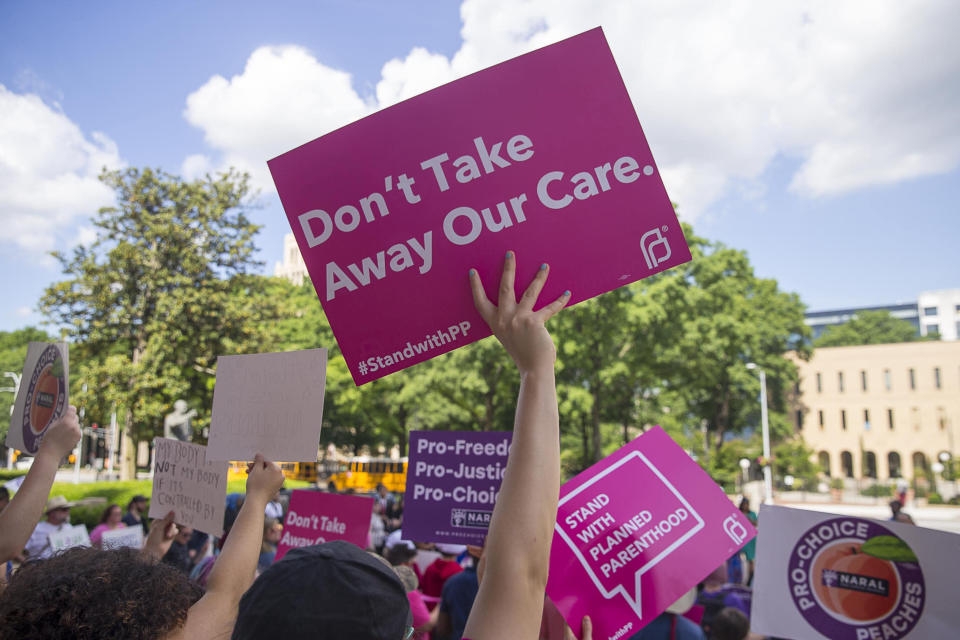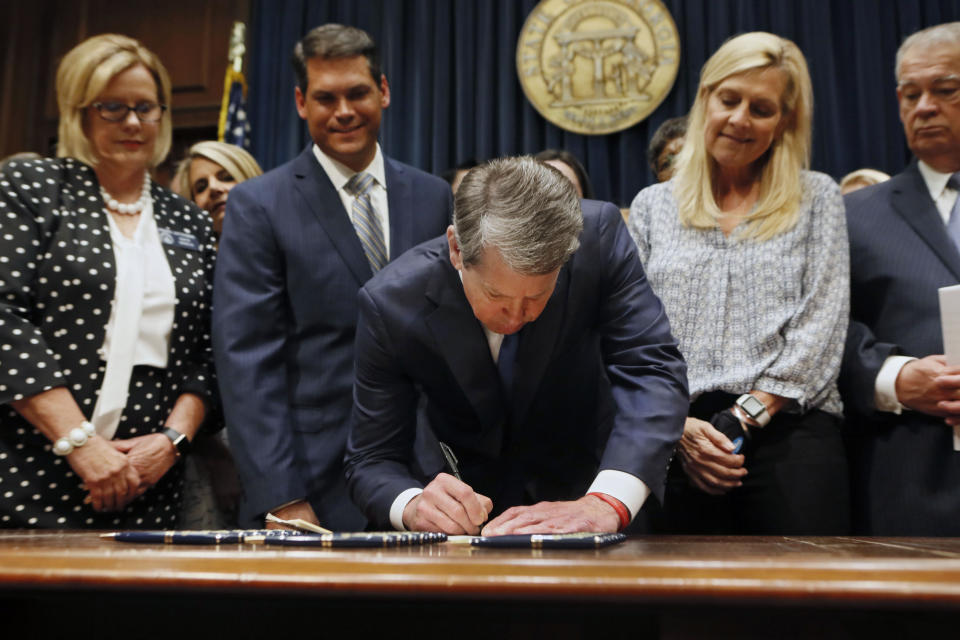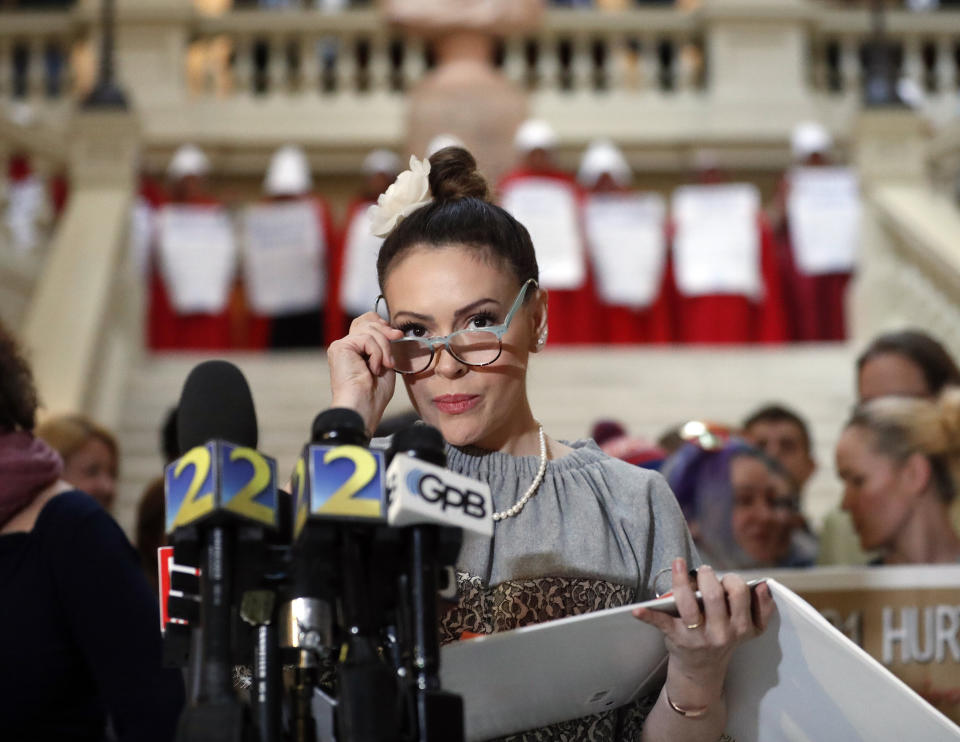New Georgia abortion law draws Hollywood backlash
The television and film industry struck back this week at the state of Georgia, whose governor just signed one of the strictest abortion laws in the nation.
But the reaction was slower and smaller than in 2016, when a “religious rights” bill that would have allowed discrimination against LGBTQ persons provoked a boycott threat that led then-Gov. Nathan Deal to veto the measure.
Five production companies announced Thursday that they would no longer work in the state, which has attracted high-profile productions in the past decade with generous tax incentives. Blown Deadline Productions (run by David Simon, creator of “The Wire” and “The Deuce”), Killer Films (the production company behind “First Reformed” “Carol” and “Vox Lux”), Duplass Brothers Productions (the Mark Duplass-helmed company with a four-film deal with Netflix), Color Force (“Crazy Rich Asians” and “The Hunger Games”) and CounterNarrative Films (Netflix’s “Triple Frontier”) all said they would stop work in Georgia as long as the law stood. More than 100 actors, including major stars, have pledged to boycott productions in the state as well.

Killer Films CEO Christine Vachon said the company would "no longer consider Georgia as a viable shooting location until this ridiculous law is overturned." Duplass added, “Don’t give your business to Georgia. Will you pledge with me not to film anything in Georgia until they reverse this backwards legislation?"
"I can’t ask any female member of any film production with which I am involved to so marginalize themselves or compromise their inalienable authority over their own bodies,” wrote Simon in a series of Twitter messages. “I must undertake production where the rights of all citizens remain intact. Can only speak for my production company. Our comparative assessments of locations for upcoming development will pull Georgia off the list until we can be assured the health options and civil liberties of our female colleagues are unimpaired."

Gov. Brian Kemp signed the “heartbeat” bill, which would criminalize abortions after six weeks of gestation — before many women even know they are pregnant — into law this week. HB 481 classifies unborn children as “distinct, living persons,” which would mean any woman who terminates a pregnancy would be subject to prosecution for murder, punishable by life imprisonment or death in Georgia. If a woman travels outside Georgia for an abortion, she could be charged with conspiracy to commit murder, a potential 10-year sentence.
The law would not go into effect until January 2020 and faces a court challenge from abortion-rights advocates. A similar six-week law in North Dakota was struck down by the courts in 2016, but anti-abortion activists have hope that with Justice Brett Kavanaugh now on the Supreme Court they have a chance to overturn Roe v. Wade. Alabama is also close to passing a statewide abortion law that would become the strictest in the nation.
When the Georgia bill began to work its way through the Georgia legislature, actress Alyssa Milano spearheaded an initiative to pressure a boycott of the state. Milano told Yahoo News that she is contractually obligated to work in the state for one more month on the Netflix series “Insatiable” but would cease working there after that.
“Obviously, those who are already contractually obligated to be there, should fight to get their show out of Georgia while continuing their contractual obligation,” said Milano. “I have to be there for another month, but you can be sure I will fight tooth and nail to move ‘Insatiable’ to a state that will protect our rights. And if it doesn’t move to another state, I will not be able to return to the show if we are blessed with a third season. This is my leverage. I will use it for the betterment of society and our great country.”
Among the actors to sign onto Milano’s petition promising to boycott the state are Oscar winners Patricia Arquette, Brie Larson and Natalie Portman, and Oscar nominees Naomi Watts, Jessica Chastain, Laura Dern, Minnie Driver, Alec Baldwin and Don Cheadle. The presence of Larson, Cheadle, Tessa Thompson and Mark Ruffalo among the signees is of note because they are all part of the Marvel Cinematic Universe, which has used Atlanta as a hub. The Writers Guild of America has also spoken out against the bill.

Tax incentives for production were raised to 30 percent in 2008 and the film business has surged in the Peach State since, including popular productions like “The Walking Dead” “Stranger Things” and “Avengers: Endgame.” The $800 million in tax credits handed out in the 2017 fiscal year are more than New York and California combined for what the governor’s office said were 455 projects and nearly $3 billion in direct spending.
But in a statement to Deadline, the Motion Picture Association of America (MPAA) indicated it would take a wait-and-see attitude toward the Georgia law.
“Film and television production in Georgia supports more than 92,000 jobs and brings significant economic benefits to communities and families,” said MPAA spokesman Chris Ortman. “It is important to remember that similar legislation has been attempted in other states and has either been enjoined by the courts or currently being challenged. The outcome in Georgia will also be determined through the legal process. We will continue to monitor developments.”
The industry was much more vocal in its opposition to the 2016 measure on LGBTQ discrimination, with major players ranging from Netflix to Viacom condemning the law.
“Disney and Marvel are inclusive companies, and although we have had great experiences filming in Georgia, we will plan to take our business elsewhere should any legislation allowing discriminatory practices be signed into state law,” a spokesman for Disney said in March 2016.
Disney did not respond to a request for comment regarding its stance on the new abortion law.
Read more from Yahoo News:



